The international aspect of my CALP program was set for China. I must admit, this was not my first choice nor a place that I wanted to go. However, this is an experience – good or bad – and one that I was not going to miss.
We flew out of Denver on Nov. 30, where we traveled to San Francisco on our way to Beijing. The plane we took from San Francisco to Beijing was a 747, and the biggest plane I’ve ever been on. It truly amazes me that they can even get these big birds off the ground, let alone fly as far as they can.
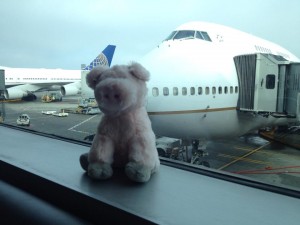 The trip was long – really long. 12.5 hours later we finally landed. Our plane followed the coastline up to Alaska, then over down across Russia and finally into China. It was interesting that to go to a country across the entire Pacific Ocean we were over land the majority of the time. We chased the sun the entire time, and since I don’t sleep well on a plane, I ended up going about 36 hours with only 3 hours of sleep. China is 15 hours ahead of U.S. Mountain time, so my days and nights are completely flip flopped.
The trip was long – really long. 12.5 hours later we finally landed. Our plane followed the coastline up to Alaska, then over down across Russia and finally into China. It was interesting that to go to a country across the entire Pacific Ocean we were over land the majority of the time. We chased the sun the entire time, and since I don’t sleep well on a plane, I ended up going about 36 hours with only 3 hours of sleep. China is 15 hours ahead of U.S. Mountain time, so my days and nights are completely flip flopped.
We landed in Beijing, and the smog that we hear so much about cannot be exaggerated. It’s horrible, and it’s everywhere. There is no place that isn’t touched by the smog. I hear as you get further West it gets better, but it doesn’t as long as there is a big city there.
The first night in Beijing after we landed was our first taste of the local cuisine. Most of the food is decent, but it doesn’t have much taste and not very many spices. Maybe they are holding back on us because they think we won’t like it, but nearly every place we have eaten has been similar. The one thing I can count on in each location is rice. There have been few meals without it, including breakfast.
Dinner the first night we were treated to Peking Duck, which was pretty good. They bring out the roasted duck whole, and then slice it into more than 100 tiny pieces. Everything is served family style on a large lazy susan in the middle of the table.
Lunch and dinner are served with alcohol of some sort. This includes wine (sometimes), and always beer (which here is sort of like PBR) and firewater (which is like Everclear). They love firewater, but I think it tastes like drinking jet fuel so I only tried it the first day.
The first full day we had in Beijing we visited the U.S. Embassy and talked with officials about agriculture here. It is nothing like it is in the U.S. The government owns ALL land now, and the farmers can only rent the land for 70 years. That started in the 1980s, so those leases have not yet come due, and they do not know what will happen when they do come due.
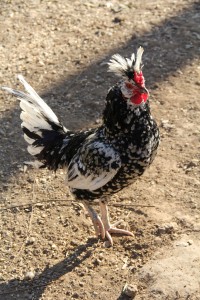 The average farmer only farms between 1-1.5 acres, and nearly 70 percent of China’s people are farmers. They are poor, extremely poor, and can barely make ends meet. Each farmer will grow several crops, and sell to someone local, who sells to someone else and so on. It eventually gets to the processor, and there are no quality standards or consistency. I can’t imagine being a food processor here.
The average farmer only farms between 1-1.5 acres, and nearly 70 percent of China’s people are farmers. They are poor, extremely poor, and can barely make ends meet. Each farmer will grow several crops, and sell to someone local, who sells to someone else and so on. It eventually gets to the processor, and there are no quality standards or consistency. I can’t imagine being a food processor here.
When we were at the Embassy, we also talked a little bit about China’s politics and social life. Everything is controlled by the government, and there is only one party in power. They control everything, and the corruption that goes along with that is rampant. The people do not have a voice here, and if you do speak up, you are punished.
Most of the people here who are older do not think for themselves, at least not out loud. They do not questions things, and do what they are told. They seem to truly believe in the government and the rules that are set. The younger generation is similar in some areas, but more of them do question things. They will have other thoughts, even if they don’t always speak them.
China is facing a huge issue with a growing number of older people and a shrinking younger generation. This is putting a huge burden on the younger generation due to the one-child family planning. If you have a second child and are not permitted to, there are stiff fines. Rural families can have two children only if the first child is a girl. If the second child is also a girl many families will abandon the second child in order to try for another boy.
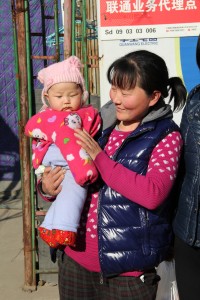 Recently, the one child policy was relaxed in China. Adults who come from a one child household can have two children, but the people we have talked to do not think that many familys will even have a second child. It’s extremely expensive to raise a child here. When it comes to education, you pay for your child to go to school, and then you pay for tutoring on top of that. It’s very competitive. Chinese people do not make very much money, and one child usually supports his/her parents when of age to work. With a married couple, both parents work and have to support their one child, and four grandparents. So the income of two people is supporting seven people. The grandparents raise the child while the parents work.
Recently, the one child policy was relaxed in China. Adults who come from a one child household can have two children, but the people we have talked to do not think that many familys will even have a second child. It’s extremely expensive to raise a child here. When it comes to education, you pay for your child to go to school, and then you pay for tutoring on top of that. It’s very competitive. Chinese people do not make very much money, and one child usually supports his/her parents when of age to work. With a married couple, both parents work and have to support their one child, and four grandparents. So the income of two people is supporting seven people. The grandparents raise the child while the parents work.
Another problem they face is that is that they have a registration system, called Hokou. Every person who is born is registered with the government and given a card that they carry with them the rest of their life. The people who come from rural areas are registered there, even if they are born in the city. This is a problem because rural people who live in the city cannot access social services without paying for it. This includes hospitals and schools. For example, families who live in Beijing but ancestors are from rural areas cannot get a registration card for the city, no matter how long they have lived there.
This was done because the government was afraid that too many people were moving away from the rural areas (because they make much more in the city) and this was their solution. It now puts a burden on those that come from rural areas and live in urban areas because everything is much more expensive.
For lunch that day we went to a local restaurant that also sells high quality jade. Some of the carvings that they have are truly beautiful, and take a long time to make. We got to watch the master craftsman make different items, which was cool.
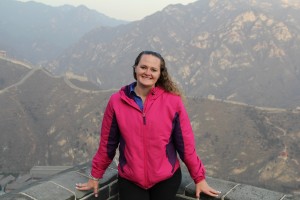 The afternoon on Dec. 2 we visited the Great Wall of China. The area where we went was all stairs, and was one of the more mentally tough challenges I have had in a while. We traveled up a very large set of stairs for over an hour to reach the top in the area where we were. My body got very tired, but mentally I wanted to do it so I made it happen.
The afternoon on Dec. 2 we visited the Great Wall of China. The area where we went was all stairs, and was one of the more mentally tough challenges I have had in a while. We traveled up a very large set of stairs for over an hour to reach the top in the area where we were. My body got very tired, but mentally I wanted to do it so I made it happen.
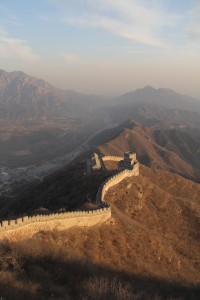 The view from the top was worth the hike. It was beautiful considering the smog, and was a once-in-a-lifetime opportunity. It’s really amazing to think about how old the wall is and the number of hours that were involved in building it completely by hand. I can’t imagine how backbreaking that work was.
The view from the top was worth the hike. It was beautiful considering the smog, and was a once-in-a-lifetime opportunity. It’s really amazing to think about how old the wall is and the number of hours that were involved in building it completely by hand. I can’t imagine how backbreaking that work was.
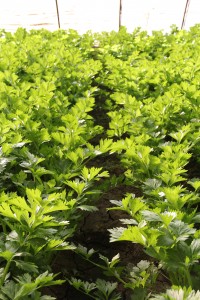 The second day in Beijing we visited an ecological farm, which is really like an agribusiness farm. They have a lot of infrastructure and teach people about agriculture. Most of their food crops are grown in greenhouses, and some of the harvest is sold and the rest is consumed by the people in the village. Only about 10 percent of what they produce is sold total. Many of the veggies are sold, but all of the corn is kept to feed the livestock and all of the livestock are consumed by the village. We also made our own dumplings there for lunch.
The second day in Beijing we visited an ecological farm, which is really like an agribusiness farm. They have a lot of infrastructure and teach people about agriculture. Most of their food crops are grown in greenhouses, and some of the harvest is sold and the rest is consumed by the people in the village. Only about 10 percent of what they produce is sold total. Many of the veggies are sold, but all of the corn is kept to feed the livestock and all of the livestock are consumed by the village. We also made our own dumplings there for lunch. 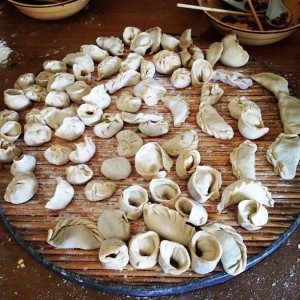
That afternoon we visited an orphanage, which was a big letdown for me. We had been told that they had 70 children there and we would get to play with them, but that was not the case. They played their movie on the place for about 20 minutes, we walked through the buildings and saw 5 kids and left. There wasn’t much to it. The orphanage is a joint venture between an American and a Chinese woman, so many of the kids who are adopted out are sent to American families.
That evening before dinner we visited the Olympic Park where the 2008 Summer Olympic Games were held. The Bird’s Nest, which is where the opening and closing ceremonies were held as well as the track and field events, was very cool to see. We also got to see the Water Cube, which is where Michael Phelps won so many medals.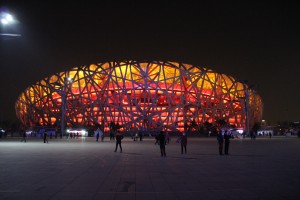
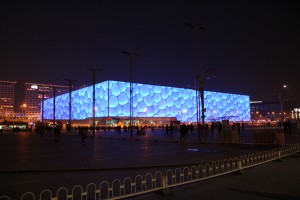
We also visited a tea house, where they make very good tea and explain the differences in all of the teas. It’s all done individually in rooms (so for example our group was all together) and then they sell it to you. If you want to buy it you have to go though their entire deal. It was very good, but the tea was expensive.
On our last day in Beijing we had a lecture in the morning from the China Science Academy on the past of Chinese agriculture and how it got to where it is today. Previous to 1930, farmers owned their own land and farmed. In 1930 the government took possession of all land in the entire country, and adopted the methods of the Soviet Union called a production brigade in their farming practices. Farmers were forced to do what the government told them to do, and every part of their life was regulated. It was a horrible time for Chinese farmers, and one that put many of them into complete poverty.
In the 1980s, the government abandoned that method and allowed farmers to have some control. Of everything that farmers grew, 20% went to the government, 40% was consumed by the family and 40% was sold to the market. That model continues, and now China is looking to go into other countries and buy land there to support their people.
 In the afternoon that day, we went to a facility that was marketed as a 3,500 head feedlot, but that was far from the truth. They had maybe several hundred, and they were all in small pens on concrete. When they feed them each animal is tried to a rail that goes around their horns. They told us they let the animals loose when they are not eating but who knows. They slaughter 200 head every Wednesday and every Saturday, and do that in three hours each day. The carcasses are hung for three days and then they are fabricated. This farm was frustrating because I don’t believe the owner was completely honest with us, and it was more of a concrete jungle than a cattle farm.
In the afternoon that day, we went to a facility that was marketed as a 3,500 head feedlot, but that was far from the truth. They had maybe several hundred, and they were all in small pens on concrete. When they feed them each animal is tried to a rail that goes around their horns. They told us they let the animals loose when they are not eating but who knows. They slaughter 200 head every Wednesday and every Saturday, and do that in three hours each day. The carcasses are hung for three days and then they are fabricated. This farm was frustrating because I don’t believe the owner was completely honest with us, and it was more of a concrete jungle than a cattle farm.
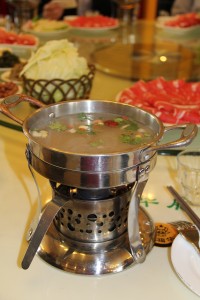 The lunch that we were served there was very good, however. We had beef hot pot, which is similar to the way that meat fondue is served here. There is a boiling pot of water with spices and herbs in it, and you drop raw slices of beef into the hot water to cook it. That meal was very good.
The lunch that we were served there was very good, however. We had beef hot pot, which is similar to the way that meat fondue is served here. There is a boiling pot of water with spices and herbs in it, and you drop raw slices of beef into the hot water to cook it. That meal was very good.
When we got back from the cattle farm, we were headed to dinner and decided to grab fast food and go to the silk market instead. What a place! It’s basically a giant mall where they sell copy items, or fakes. Everything is organized by item, so men’s stuff is one floor, jewelry another and so on. It was several stories high and we had no where near enough time to visit each floor. The way they sell things in China is very different than the way things are sold in the U.S. They are very, very pushy and everything is negotiable. You can barter items down much below what the asking price is if you are patient. There is no sales tax, and almost everything is done in cash.
After this we headed to the train station for our overnight train from Beijing to Xi’an. It was jam packed, and the security was a complete joke. You put your items through a scanner than no one is even looking at. That night we had a party on the train and slept on rock hard beds.
That night we also said goodbye to Young Young, aka Selena, who was our tour guide/translator throughout our time in Beijing. She was wonderful and very amusing. She was a great guide and very good at her job.




